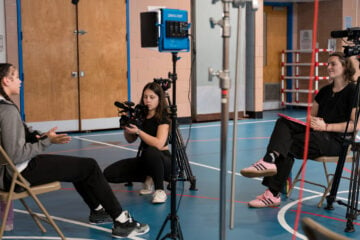Online audio market Public Radio Exchange begins beta test this month
Creators of the Public Radio Exchange plan to launch their service
this fall, opening a new channel for independent producers to sell work
to stations.
PRX operates somewhat like an Amazon.com of the indie world. A subscribing
station gets an account and uses a web-based interface to browse and
search for pieces uploaded by producers. They can consult background
information provided by producers and reviews written by other users.
Independent producer Jay Allison hatched the PRX idea in late 2001,
hoping to ease indies’ ordeal of getting their work aired. Only
a fraction of the vast indie output ever lands on programs such as NPR
newsmags or This American Life, leaving producers to sell the
rest door to door. Allison, who also developed Transom.org, an interactive
audio digest and support group for producers, wanted to blaze a path
circumventing national gatekeepers while creating a one-stop shop for
stations.
Allison’s Atlantic Public Media partnered with the Station Resource
Group to develop PRX. Based in Cambridge, Mass., it aims to start beta-testing
May 30, with full-fledged operations beginning in September. Funding
came from CPB, the Ford Foundation and the National Endowment for the
Arts.
PRX could break ground on several fronts. It could lend new assistance
to programmers navigating a vast array of indie material. It also provides
a central payment and billing shop for the two camps.
Subscribing stations will pay a flat fee for a set amount of programming—say,
120 hours a year. PRX will dole out a corresponding number of points
to stations, with each point worth a minute of programming. Stations
exchange points for producers’ work, and PRX pays the producers
out of a central pool of funds according to the points they accumulate.
Grants and user fees also go into the pool of funds. Stations will
pay a base subscription fee on top of their points charges, and producers
will pay PRX to store audio files on its servers. That charge will probably
be under $100, says Jake Shapiro, PRX’s executive director.
Producers may earn little at first, Shapiro says. But he doesn’t
expect PRX to become a lifeline for them. Most will probably include
programs already taken by other outlets. “It’s not like
the PRX is an acquirer actually purchasing work and then reselling it
at some production cost,” he says.
Money isn’t the point for independent producer Barrett Golding.
What does matter is access to stations, particularly non-NPR stations
that do not subscribe to the Public Radio Satellite System. “That’s
worth more money to me, because I can then go get funding,” he
says.
Producers will be encouraged to upload works in MP2 or MP3 formats.
MP2 offers higher sound quality, but producers may be less familiar
with encoding files in that format, Shapiro says. Some stations are
comfortable airing MP3s. For customers not yet encoding or playing digital
files, Shapiro says PRX may encode files for producers who submit CDs,
and conversely burn discs for stations that request them.
| Earlier story Allison’s content depot: a Napster for stations Originally published After 25 years in public radio, independent producer Jay Allison That means some stories, regardless of quality, get squeezed Allison is planning a project to give both independent and station-based A step beyond his website, Transom.org, Think of the Exchange as a Napster for public radio: a central Reviews and recommendations, à la Amazon.com’s “If But even a bustling Radio Exchange would be useless if the pieces He’s testing the concept on WCAI and WNAN, the Cape Cod-area A recent show included an hour about the Sept. 11 terrorist The show has become popular with listeners, Allison says, and |






